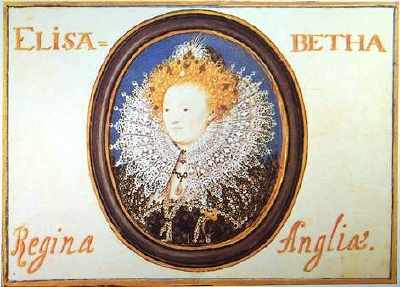Elizabeth's accession to the throne
Elizabeth's Accession Day, November 17, 1558, was celebrated triumphantly by Protestants, who looked to the new Queen as the embodiment of all their revolutionary hopes*. She was seen as a symbol of hope for a more liberal era.
Contrary to Protestant expectations, however, Elizabeth's first Parliament (1559) brought compromise instead of radical reform; avoiding the extremism of the two former regimes, the new Queen looked back to her father's reign as a role model for her government. But Elizabeth had a shrewder understanding* of the art of governing than Henry VIII and would not subjugate the good of the realm to personal or dynastic interests; she took a middle path* in both politics and religion. Of course, it was not easy to keep a balance between extremes, and sometimes her private life was very different from what she allowed the public to see.
Good luck?
In many ways, Elizabeth's easy succession to the throne at a time of volatile religious tensions was a matter of luck. The threat of principal Catholic leaders was neutralized without effort thanks to the early death of the principal Catholic cleric, Cardinal Pole, and Lord Chancellor Heath's unswerving loyalty to the Tudors. London citizens and members of the Commons were predominantly Protestant, and there was no other strong claimant to the throne--Mary Stuart held the best claim, but her marriage to the French king made such a choice distasteful even to many Catholics (they had just escaped the foreign yoke of Spain and were not eager for another). The danger of faction also made it tactful for the new Queen to remain single, since marriage would have provided a rival focus for political action. All hopes were thus concentrated in Elizabeth.
Her reputation* after her death.
Footnotes
-
Beginnings of a cult
The cult of Elizabeth was already developing in the Accession Day sermons of Puritan ministers, who stressed biblical parallels with the theme of liberation: Elizabeth was compared to Deborah, the Judge of Israel whose guidance enabled Barak to liberate their people from tyranny (Judges 4,5).
Elizabeth's coronation prayer
This prayer was composed by Elizabeth and spoken on her behalf during ceremonies following her coronation:
O LORD ALMIGHTY and everlasting God, I give Thee most hearty thanks that Thou hast been so merciful to me as to spare me to behold this joyful day. And I acknowledge that Thou hast dealt as wonderfully and mercifully with me as Thou didst with Thy true and faithful servant Daniel, Thy prophet, whom Thou delivered'st out of the den from the cruelty of the greedy and raging lions. Even so was I overwhelmed and by Thee delivered. To Thee, therefore, only be thanks, and praise, forever. Amen.
(From Rice, The Public Speaking of Queen Elizabeth.) -
A pragmatic Queen
Elizabeth held to a middle path (via media) as far as possible, but she was only tolerant when it was good policy to be so; like a true pupil of Machiavelli, she maintained a popular image while having "a flexible disposition, varying as fortune and circumstances dictate."
Elizabeth was probably familiar with Machiavelli's ideas on public image:
[A prince] should appear to be compassionate, faithful to his word, kind, guileless, and devout.
(Machiavelli, The Prince). -
A Queen of two faces
As Elizabeth's use of propaganda suggests, she was a queen with two faces: a benevolent public face and a much less tolerant private face. In her public life Elizabeth took great pains to improve her appearance, wearing cosmetics and holding a perfumed silk handkerchief in her mouth before she received visitors; however, in her private life she could be ruthless, as became apparent when the Earl of Essex burst into Elizabeth's dressing room with what he thought to be important news. While this earned Essex the distinction of being the only one of her close advisors to see her without cosmetics, Elizabeth was greatly offended by the intrusion. This incident was a contributing factor in Essex's fall from favor, which eventually lead him to promote the Essex rebellion.
-
An anniversary
The measure of Elizabeth's success as a ruler may be gauged in part by the duration of her popularity even long after her reign; the date of her accession became an annual holy day, the birthday of the Anglican Church, and continued to be celebrated with festivities and pealing church bells even into the 18th century (when the Enlightenment and time's moderating effect lessened religious and patriotic fervor).
John Dryden wrote this verse in 1679:
Fixt in our hearts thy fame shall live;
And maugre all the popish spite,
To honour thee our youth shall strive,
And yearly celebrate this night.
